A Brief But Necessary Forward:
The review copy of this DVD was stamped all the way through with a rather large 'Review Copy Only'. While I appreciate the necessity to maintain some security in this digital age (that's almost an Assangian oxymoron right there), it did mar the pleasure of the viewing. Whilst both Slarek and I have the requisite skills to remove it for our frame grabs, it's just more time and both of us spend enough spare time – in Slarek's case, all of his – on these reviews as it is. So apologies in advance for the cluttered frame grabs.
| |
"Finance...what finance? It was shot for under ten grand. I hoped to do it for five...but then the crew needed more food than I budgeted for (laughs). Seriously, it was made because of the generous contributions of actors and crew who believed in it." |
| |
Director, Ciarán O'Connor when asked if it
was difficult to get financing for the movie |
Ah, how those words resonate so strongly with me. O'Connor's efforts and experience mirror my own almost down to the penny. If you want to make a movie and maintain control, you pay for what you need to pay for and rely on supportive loved ones, talented friends, actors and technicians and the kindness and generosity of those who understand what it takes and means to actually write and direct a full blooded movie on an anaemic budget. Of course, with today's digital revolution in full swing, the kit is not hard to come by. So the film is made but so often the stumbling block (more often a granite wall a hundred metres high) is what then? Every filmmaker is a communicator. So how do you get your work out there? That's a question I ask myself daily.
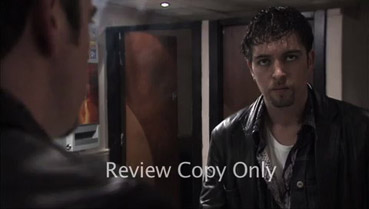
Some, like O'Connor, get post-production backing from sympathetic Arts bodies, in this case the Irish Film Board. Some (the very, very few) roman-candle themselves into the limelight and ride a hype propelled rocket into a mainstream career via success at festivals and suchlike. Just to put things in to a little perspective; one of the best-known festival debuts, Reservoir Dogs, wasn't Tarantino's breakout hit (that was Pulp Fiction of course) – some people just think it was the heist gone wrong, one-eared cop movie. Subsequent foreign earnings and DVD/VHS sales pushed it well into profit but despite a Sight and Sound cover in the UK, it's US domestic run netted just over twice its meagre budget of $1.2 million. Not that financial success is any indicator of quality or passion, you understand but any kind of distribution is bloody difficult unless someone out there thinks they can make a buck. Like it or not, we're all slaves to commerce in one way or another.
To get a theatrical distribution would seem like the Holy Grail but if there is money to be made (yes, independent filmmakers have to eat or so I'm told) most of it goes to the distributors. There's a reason that Tarantino is Tarantino. And he literally may be one in a million. For every indie success story there are one short of a million others vying for attention. Timing is all, and friends in high places don't hurt one bit. I mused on writing a book on breaking into the media industry. There would be only one chapter, one sentence and it's pretty bleak: "Who do you know in the business and why aren't you surgically attached to them?" It's neither a great way nor a dignified one to start a career. I got in on an overabundant enthusiasm and a willingness to take any job at all just to get through the door. I've been hanging on under the jamb ever since. But then that was in the Pleistocene era before media studies and film schools had sprung up like fungi falsely implying a promise, like Catholicism, of an after-school-life granting your dearest career wishes.
So on to O'Connor's Trafficked renamed from the more esoteric Capital Letters – I suspect for commercial reasons. Slarek finds intriguing titles intriguing and gravitates towards them. Joe Public, so the distributors believe, don't. How Tarantino persevered with Reservoir Dogs (with neither volumes of drinkable water nor canids in sight) is beyond me. What would you have called it as a distributor? Mr Pink Smells A Rat? Or how about Pardon? (think about it...) To be fair to those who provided Trafficked money for a theatrical release (with the assumption of a 'two bob and a toffee apple' marketing budget), it's a tough sell if the movie sounds like a filmed sequel to the pedant's grammar bible Eats Shoots And Leaves. The 'letters' of the previous and now discarded title refer to the short but effective voice-overs in the film (letters 'written' to the heroine's sister) and I assume the 'capital' is Dublin. The new one tends to scream 'commercial, sex, drugs and vulnerable women'. Give 'em what we think they want... ho hum. Lets get beyond that. And let's also push past the budget if we can. It's a movie. Did I care?
Yes, I did.
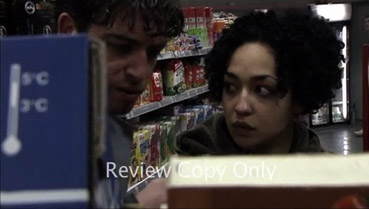
Ruth Negga plays Taiwo, a trafficked, vulnerable young African girl in the horrible maw of the criminal machinery of Dublin's McManus, a dealer in human suffering. I'm pretty sure it would be listed differently on his CV. Knowing her future predicament, a one-way trip to becoming a drugged up, sexual plaything to be abused daily by anyone who can pay, she bolts. Stop for a moment and put yourself in her shoes. You have nothing but a plastic bag of clothes, no passport and a photo of you and your sister. It's Dublin at its coldest and greyest. Can you imagine a worse situation? That's not a crack at Dublin at all despite my only visit being swathed in grey sleet for the entire trip. You know no one and for some inexplicable reason you waver at the police station and do not go in. I didn't quite get that but as Alfred Hitchcock told François Truffaut in their excellent extended interview regarding why the lover and sister don't call 911 in Psycho; "They don't go to the police because it's dull." Who can argue with that? I think I'd prefer tired policemen and underpaid social workers to the bastards we know she's heading for. But I guess it's the relationship she has with her sister that keeps her walking. Once caught up in the immigration bureaucracy, she wouldn't be able to get her sister over. And reuniting with her seems to be all Tiawo cares about.
If Negga is familiar (and this bugged me until I could look it up) she's Curtis' future lover in Misfits, the rather wonderful E4 take on 'X Men and Women' on ASBOs. As Tiawo is 'foreign', she knows very little English and so most of her communication has to come from knowing glances and frightened eyes. It doesn't hurt that she's extremely attractive and therefore (inexplicable but there you go) achingly vulnerable. This set alarm bells ringing for me right away. I put my smile away in a box to be opened in 85 minutes. I was about to take a dark journey. That was in no doubt. At first, Taiwo is befriended by a local middle man, Keely (Karl Sheils) who sets her up in a B & B, secretly steals from her and then, oddly, takes her in, proof of an attraction we hope doesn't lead to misery. For a short time, Tiawo has a life of sorts (her African accented English voiceover fills in a few gaps but it's never over done). But we know what's coming which is a regrettable shortfall in the story however earnest and well told. When it is discovered that Keely has Tiawo and this info is presumably relayed to top dog McManus, I was waiting for the door to break down any minute. McManus seemed awfully reasonable about letting the couple stay together for a little while longer until Keely brings a desperate deal to the crime lord.
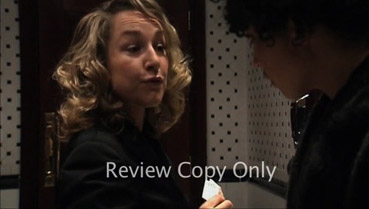
The two leads are convincing and enjoy the onscreen chemistry of mutual need. Keely's feelings develop over mundane efforts to live a relatively good life. Sheils plays him a few beers short of a bar and I say that only because one's love for someone has to be pretty damn potent and intoxicating to risk everything to save them. He's humanised by his interactions with his grandmother and the feelings he is developing for what some see as another man's property, will have him turning some very dark corners. Again, you have to be able to accept that this man would walk into the lion's den for this girl. I'm reminded of the cliché – either very brave or very dumb. But then who says love is based on courage or intelligence?
O'Connor's direction seems to be somewhat dictated by the 'grab it and run' school of filmmaking and while there's nothing wrong with that, it seems less of a personal style and more of something forced on to the film by monetary and practical circumstance. It's the film's weakest area (the painful restrictions of an ultra low budget and a higher ambition). There are also editing decisions that run parallel with this style (think roving camera and sometimes snatched tilts and pans which forces the cutting into urgency – again, no bad thing). While both direction and editing are in sync most of the time, the style almost gets in the way of the characters we are trying to empathise with. There's a cut early on as Tiawo is laying her head down in the B&B and it is either an odd homage to Scorsese's Mean Streets or the timing is way off and it pulled me up short. Or maybe it's an online screw up.
The film has a vibrant immediacy and never lacks for pace but it is telling a Mona Lisa story with very few original narrative directions to follow. It doesn't help that almost everyone else in the film is irredeemably despicable and most of all, Leslie, the madam for McManus, Jasmine Russell. She may manage the girls but there's real steel in there and when you hear her say to Tiawo after something extremely unpleasant, "It's a cruel world, love. But you'll learn to deal with it." I wanted to reach into the screen and scream at her. Tiawo's world is a cruel one and I'm sure there are more terrible situations a young girl could get herself wrapped up in but it's all relative. Maybe even in the seamier side of Dublin, she's better off from where she originated. I shudder to think about that if it's true. If I had any real problems with the story, it's the harrowing inevitability of it and the staying strictly within those self imposed boundaries. I'm not sure how this sort of narrative could play out differently given the set up but I always want to be behind a film (in both senses) and let it surprise me, stay ahead of me. Trafficked is a good, honest stab at dark drama and the director and cast and crew should be applauded for the effort but there is one aspect of the film that really hurts it.
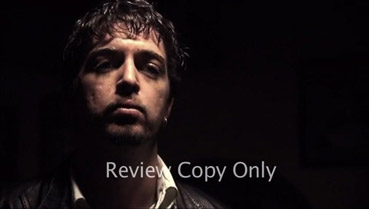
Again, budgetary I suspect but shooting on video (as my own camera person on my own effort reminded me on a daily basis) you have to be damn careful to avoid burn out in the brightest areas of the frame and wary at handling areas of black and shadow. Film is much kinder. I have yet to find out what the film was originated on but burn out is a real problem a lot of the time but it's the deeply affecting moments, mostly at the denouement that are hit hardest in the shadows. It's that extra effort to be made to make out an expression on a face, a twinkle or sadness in the eyes. Don't get me wrong, the drama is still effective but making an audience work hard is detrimental and frustrating. And with film, you can rescue an over or underexposed shot. With video, the latitude is significantly decreased.
So, despite having no choice but to be sympathetic and empathic to the filmmakers and their constraints, being in the same boat (without a distribution paddle as of this writing), it has to be said that the technical issues do sometimes get in the way for full appreciation of what's been achieved here. The acting is sound, the writing realistic (not an area of society I have any experience of so what do I know of 'realism'?) and shooting and editing are urgent and immediate. As long as you're happy to overlook the single narrative track that the film never strays from, you'll be entertained. It's just next time, I hope O'Connor gets his hands on some film stock (that goes for me too).
The 1.76:1 anamorphic DVD Review copy picture quality is generally solid when the light's right. The variable shots have some bright light burn out and more crucially some drama is lost in the shadows – notably Keely's intervention in a car park and Tiawo's return to the flat at the denouement. Detail is sometimes obscured by artifacts that do not belie the source video. From Stoney Road, the distributors, I'll quote from an email correspondence regarding the picture source, sound and Extras available.
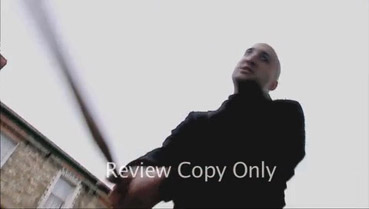
"The sound is Dolby Stereo, it was originated on digital video, DVC PRO to be precise.There are no sub-titles or closed captioning."
For the first time in my experience (OK, it's a review disc) not only are there no extras but there's no menu either! From Stoney Road again...
"For the extras there will be biogs, still images, interviews with director and actors, trailers, and some info on the issues of human trafficking."
An ambitious step into the darker areas of Irish society dented somewhat by the technical means to bring it satisfactorily to the screen. Given this caveat, Trafficked is a solid and passionate piece of work with good performances and is worth a look but don't be too demanding about narrative originality.
|